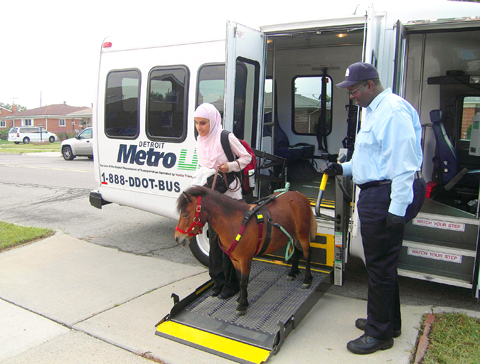Mona Ramouni’s fingers fly across the text as she proofreads yet another page of a calculus textbook to be published in Braille — with her guide pony sitting patiently by.
It is dull work for tiny Cali who serves as Ramouni’s eyes through a world she cannot see, and the pony keeps butting her head into Ramouni’s chest.
“Cali! Stop it,” Ramouni exclaims, but she cannot keep the pride out of her voice when she realizes what the pretty brown pony with a soft black mane has gotten up to. Rolling back her lips, Cali grasps the tab of the zipper on the bag of treats Ramouni carries around her waist and is slowly pulling it open with her teeth.

PHOTO: AFP
“She knows which part has the carrots,” Ramouni says in amazement. “She’s really smart.”
Cali is just one of a handful of miniature horses in the US known to be used as guide animals for the blind. Weighing less than 45kg, miniature horses are about the same size as a large dog but are much stockier and can help support people with mobility issues. They also have significantly longer life spans — they can live and work for more than 30 years while guide dogs are usually retired by age 12 — but require much more care and bear a far heftier price tag.
Cali is the first guide animal for Ramouni, 28, a devout Muslim whose parents — Jordanian immigrants — would not accept a dog into their home. Dog saliva is considered unclean in Islamic teaching, although dogs are permitted to be used as work animals, such as guards or shepherds.
“There is a saying of the Prophet Mohammed accepted by most Muslims that the angels do not enter the homes where dogs are,” said Dawud Walid, director of the Michigan chapter of the Council on American Islamic Relations.
While several prominent academics have determined that guide dogs are acceptable under Islamic rules, it remains a cultural taboo for many Muslims, he said.
Ramouni says her parents aren’t fond of animals in general, although they did let her have a pet rabbit and are warming to the pony that lives in a small enclosure in the yard of their tidy brick home in Dearborn, Michigan. And after some initial trepidation about how their daughter would fare with only a miniature horse to watch out for her, they have begun to trust that Ramouni will be okay on her own.
“My whole world and my whole outlook on stuff has changed, because I feel that there are a lot more possibilities,” Ramouni tells a visiting reporter. “Before Cali, I didn’t feel like I could go places on my own, although theoretically I probably could have.”
Ramouni was taught as a child how to guide herself with a cane, but never really took to it. With six siblings, there was always someone around to take her by the arm.
She began looking into guide horses on a whim, becoming more determined to make it happen every time someone told her she couldn’t — or shouldn’t. There was the neighbor who tried to get the city council to deny her a permit for Cali’s shed. The nasty e-mails from people attacking her family’s religious beliefs. And then there was all the work it took to find a trainer, find a horse and learn how to trust and care for Cali.
Ramouni bought the three-year-old former show pony last October and sent her to professional trainer Dolores Artse, who spent seven months teaching Cali to tap her hoof to point out obstacles, get in and out of cars and buses, and even pick up misplaced objects.
It generally takes six months to a year for the relationship with a service animal to solidify and Ramouni’s first six weeks with Cali have been intense.
“I’m working with Cali. She’s working with me. We’re sort of figuring each other out,” Ramouni says.
“She is the most awesome little horse. If she can do it, if she thinks she can do it, she will. If she feels that there is a possibility for her to do it, she will try with all her heart,” she says.

NO EXCUSES: Marcos said his administration was acting on voters’ demands, but an academic said the move was emotionally motivated after a poor midterm showing Philippine President Ferdinand Marcos Jr yesterday sought the resignation of all his Cabinet secretaries, in a move seen as an attempt to reset the political agenda and assert his authority over the second half of his single six-year term. The order came after the president’s allies failed to win a majority of Senate seats contested in the 12 polls on Monday last week, leaving Marcos facing a divided political and legislative landscape that could thwart his attempts to have an ally succeed him in 2028. “He’s talking to the people, trying to salvage whatever political capital he has left. I think it’s

Polish presidential candidates offered different visions of Poland and its relations with Ukraine in a televised debate ahead of next week’s run-off, which remains on a knife-edge. During a head-to-head debate lasting two hours, centrist Warsaw Mayor Rafal Trzaskowski, from Polish Prime Minister Donald Tusk’s governing pro-European coalition, faced the Eurosceptic historian Karol Nawrocki, backed by the right-wing populist Law and Justice party (PiS). The two candidates, who qualified for the second round after coming in the top two places in the first vote on Sunday last week, clashed over Poland’s relations with Ukraine, EU policy and the track records of their

UNSCHEDULED VISIT: ‘It’s a very bulky new neighbor, but it will soon go away,’ said Johan Helberg of the 135m container ship that run aground near his house A man in Norway awoke early on Thursday to discover a huge container ship had run aground a stone’s throw from his fjord-side house — and he had slept through the commotion. For an as-yet unknown reason, the 135m NCL Salten sailed up onto shore just meters from Johan Helberg’s house in a fjord near Trondheim in central Norway. Helberg only discovered the unexpected visitor when a panicked neighbor who had rung his doorbell repeatedly to no avail gave up and called him on the phone. “The doorbell rang at a time of day when I don’t like to open,” Helberg told television

A team of doctors and vets in Pakistan has developed a novel treatment for a pair of elephants with tuberculosis (TB) that involves feeding them at least 400 pills a day. The jumbo effort at the Karachi Safari Park involves administering the tablets — the same as those used to treat TB in humans — hidden inside food ranging from apples and bananas, to Pakistani sweets. The amount of medication is adjusted to account for the weight of the 4,000kg elephants. However, it has taken Madhubala and Malika several weeks to settle into the treatment after spitting out the first few doses they